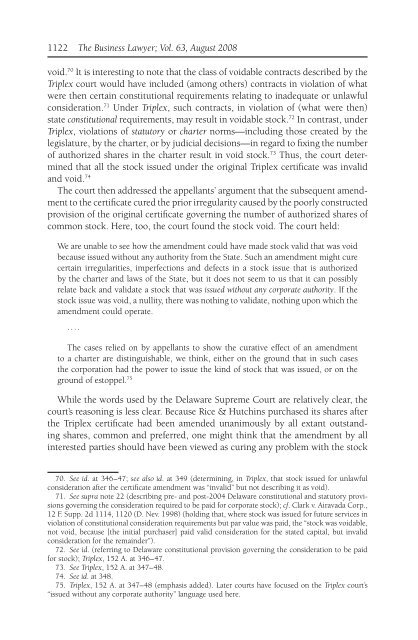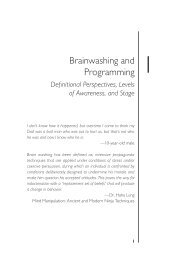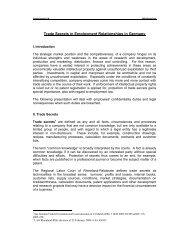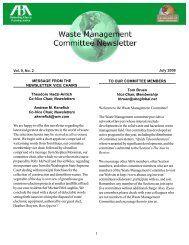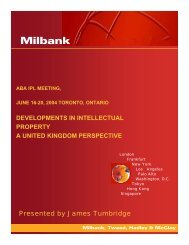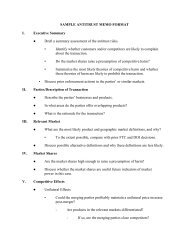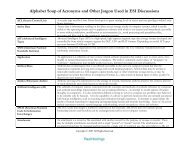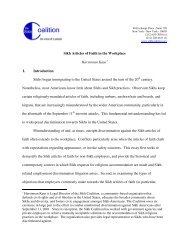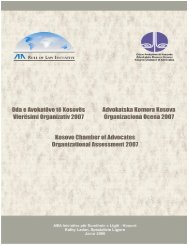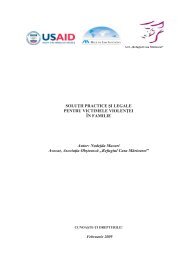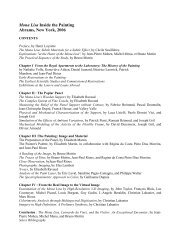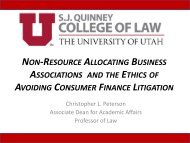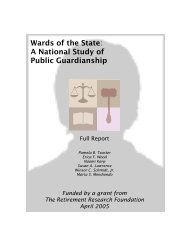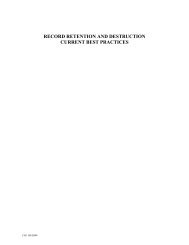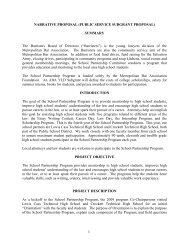Curing Defects in Stock Issuances - American Bar Association
Curing Defects in Stock Issuances - American Bar Association
Curing Defects in Stock Issuances - American Bar Association
Create successful ePaper yourself
Turn your PDF publications into a flip-book with our unique Google optimized e-Paper software.
1122 The Bus<strong>in</strong>ess Lawyer; Vol. 63, August 2008<br />
void. 70 It is <strong>in</strong>terest<strong>in</strong>g to note that the class of voidable contracts described by the<br />
Triplex court would have <strong>in</strong>cluded (among others) contracts <strong>in</strong> violation of what<br />
were then certa<strong>in</strong> constitutional requirements relat<strong>in</strong>g to <strong>in</strong>adequate or unlawful<br />
consideration. 71 Under Triplex, such contracts, <strong>in</strong> violation of (what were then)<br />
state constitutional requirements, may result <strong>in</strong> voidable stock. 72 In contrast, under<br />
Triplex, violations of statutory or charter norms—<strong>in</strong>clud<strong>in</strong>g those created by the<br />
legislature, by the charter, or by judicial decisions—<strong>in</strong> regard to fi x<strong>in</strong>g the number<br />
of authorized shares <strong>in</strong> the charter result <strong>in</strong> void stock. 73 Thus, the court determ<strong>in</strong>ed<br />
that all the stock issued under the orig<strong>in</strong>al Triplex certifi cate was <strong>in</strong>valid<br />
and void. 74<br />
The court then addressed the appellants’ argument that the subsequent amendment<br />
to the certifi cate cured the prior irregularity caused by the poorly constructed<br />
provision of the orig<strong>in</strong>al certifi cate govern<strong>in</strong>g the number of authorized shares of<br />
common stock. Here, too, the court found the stock void. The court held:<br />
We are unable to see how the amendment could have made stock valid that was void<br />
because issued without any authority from the State. Such an amendment might cure<br />
certa<strong>in</strong> irregularities, imperfections and defects <strong>in</strong> a stock issue that is authorized<br />
by the charter and laws of the State, but it does not seem to us that it can possibly<br />
relate back and validate a stock that was issued without any corporate authority. If the<br />
stock issue was void, a nullity, there was noth<strong>in</strong>g to validate, noth<strong>in</strong>g upon which the<br />
amendment could operate.<br />
. . . .<br />
The cases relied on by appellants to show the curative effect of an amendment<br />
to a charter are dist<strong>in</strong>guishable, we th<strong>in</strong>k, either on the ground that <strong>in</strong> such cases<br />
the corporation had the power to issue the k<strong>in</strong>d of stock that was issued, or on the<br />
ground of estoppel. 75<br />
While the words used by the Delaware Supreme Court are relatively clear, the<br />
court’s reason<strong>in</strong>g is less clear. Because Rice & Hutch<strong>in</strong>s purchased its shares after<br />
the Triplex certifi cate had been amended unanimously by all extant outstand<strong>in</strong>g<br />
shares, common and preferred, one might th<strong>in</strong>k that the amendment by all<br />
<strong>in</strong>terested parties should have been viewed as cur<strong>in</strong>g any problem with the stock<br />
70. See id. at 346 – 47; see also id. at 349 (determ<strong>in</strong><strong>in</strong>g, <strong>in</strong> Triplex, that stock issued for unlawful<br />
consideration after the certifi cate amendment was “<strong>in</strong>valid” but not describ<strong>in</strong>g it as void).<br />
71. See supra note 22 (describ<strong>in</strong>g pre- and post-2004 Delaware constitutional and statutory provisions<br />
govern<strong>in</strong>g the consideration required to be paid for corporate stock); cf. Clark v. Airavada Corp.,<br />
12 F. Supp. 2d 1114, 1120 (D. Nev. 1998) (hold<strong>in</strong>g that, where stock was issued for future services <strong>in</strong><br />
violation of constitutional consideration requirements but par value was paid, the “stock was voidable,<br />
not void, because [the <strong>in</strong>itial purchaser] paid valid consideration for the stated capital, but <strong>in</strong>valid<br />
consideration for the rema<strong>in</strong>der”).<br />
72. See id. (referr<strong>in</strong>g to Delaware constitutional provision govern<strong>in</strong>g the consideration to be paid<br />
for stock); Triplex, 152 A. at 346 – 47.<br />
73. See Triplex, 152 A. at 347– 48.<br />
74. See id. at 348.<br />
75. Triplex, 152 A. at 347– 48 (emphasis added). Later courts have focused on the Triplex court’s<br />
“issued without any corporate authority” language used here.


